NEWS The National Doctoral Programme in Infections and Antibiotics, NDPIA, covers infection biology in a broad sense, from humans and animals to plants and is a success story. Since the first student enrolled in 2014, the research school has hosted more than 700 PhD student and postdoc members.
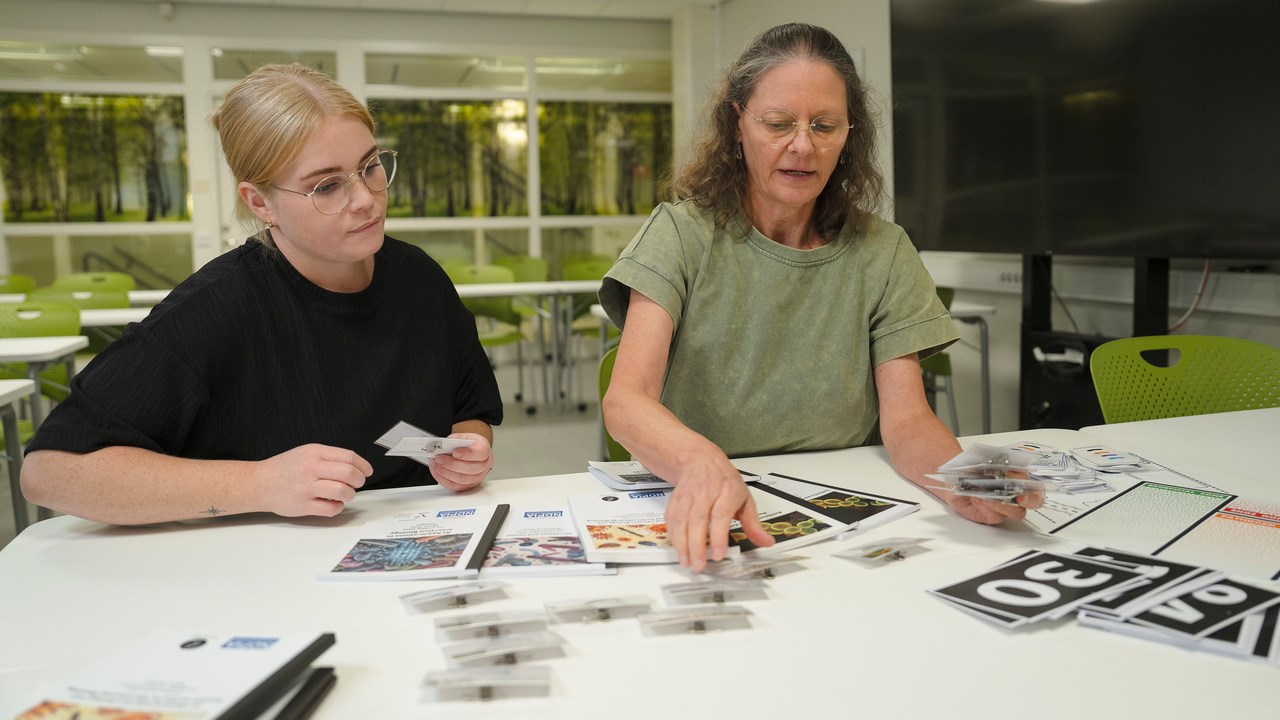
In the NDPIA research school, Debra Milton works closely with the project coordinator, Hanna Eriksson.
ImageMattias PetterssonI hope that NDPIA has played a small role in their continued interest in research
With a solid experience from running two prior research schools at Umeå University, Professor Debra Milton was appointed director of the research school in 2020.
“I absolutely enjoy this work! I meet so many amazing scientists and learn new state-of-the-art techniques in infection biology,” says Debra Milton, professor at the Department of Molecular Biology at Umeå University.
NDPIA was initiated by The Laboratory for Molecular Infection Medicine Sweden, MIMS, in Umeå. Professors Bernt Eric Uhlin and Åke Forsberg organised a joint application between six national universities and institutes for a 2013 Swedish Research Council (Vetenskapsrådet) call for funding a research school focused on infection biology.
The application was successful, and the six Swedish partner universities received an initial 15 million SEK to establish and run the new research school. In 2016, the funding was prolonged for another 5 years with an additional 10 million SEK. In 2021, a further extension for use of the funding through 2024 was granted due to the COVID-19 pandemic. Åke Forsberg was the first national director from 2013-2019.
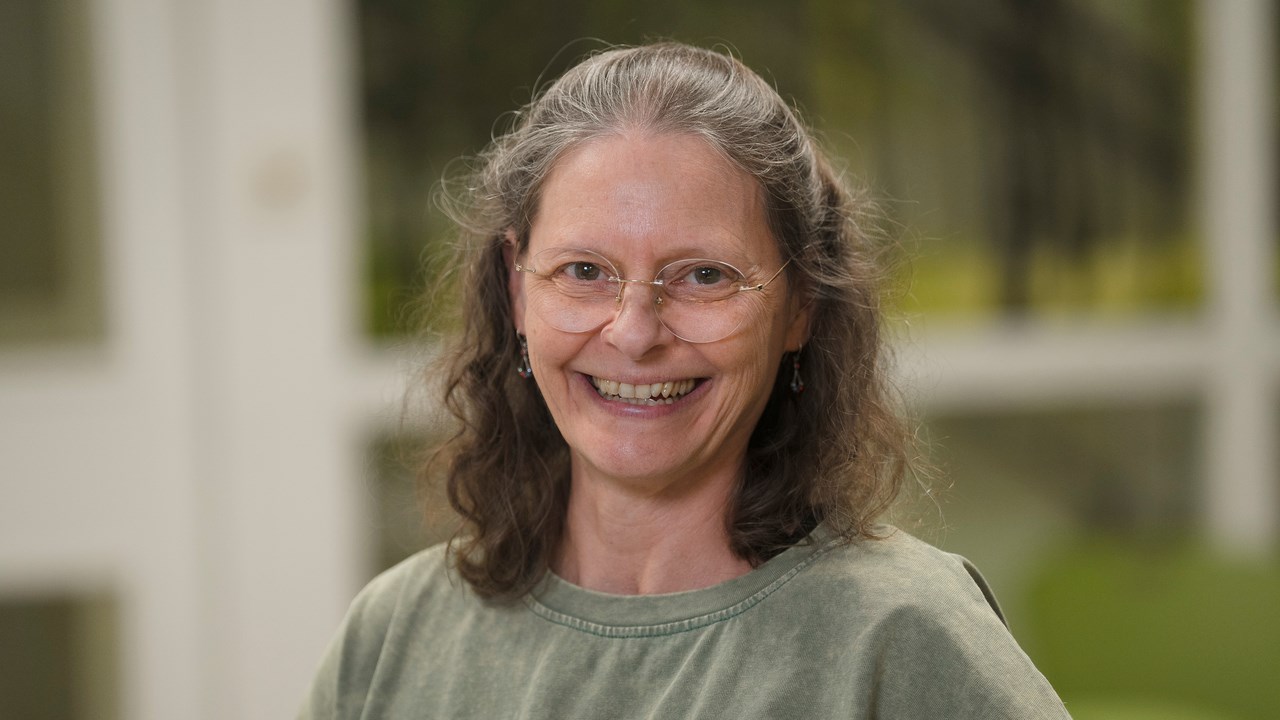
Current NDPIA director Debra Milton gets very involved in the courses; she is creative and has lots of ideas aiming to meet the needs of young researchers.
ImageMattias PetterssonPhD students and postdocs enrolled at a Swedish university or at one of NDPIA’s international partners and studying infection biology and/or antibiotics are welcome to apply for a membership in NDPIA.
The NDPIA-organized courses are a core activity of the programme and are either free of charge or co-funded by NDPIA. Each course enrols 25-40 members, and the students may receive ECTS credits at their home university for their participation.
“Our courses are often fully booked and very well received. We have a good reputation; a good token is that the students participate in more than one course and the courses receive interest from international students,” says Debra Milton.
Throughout the years, the courses have been held in many different sites within Sweden.
“Now, we hold the courses most often at a venue, which allows the students to focus on a topic for 3-5 days and to present poster presentations. We have experienced that hosting a course at a conference centre leads to a relaxed atmosphere with more time to network and to discuss with other participants and lecturers, who are national and international experts within the course topic. In this way the students build up their scientific network. That is quality time!”
By attending the NDPIA courses, students have stated that they have gained new ideas and directions for their research and some students have established new research collaborations with other labs in Sweden or international labs.
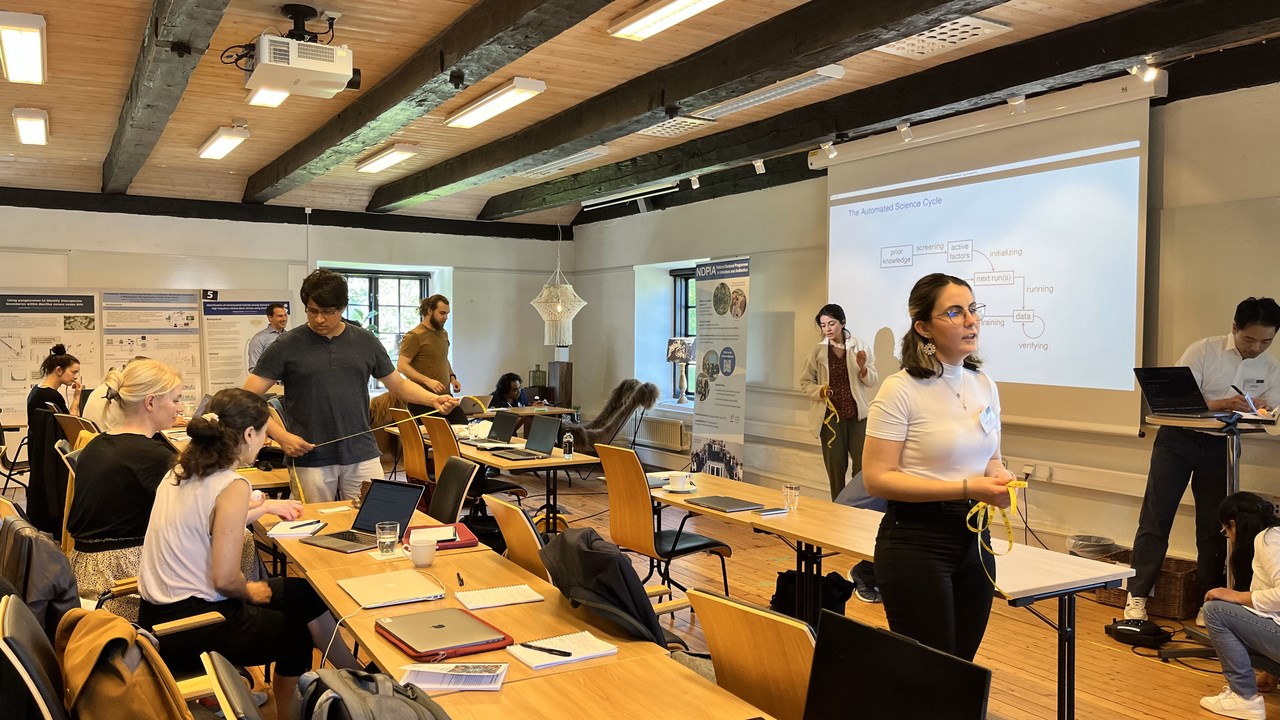
Assistant Professors Paul Jensen from University of Michigan, USA, and Mark Hendricks from Whitman College, USA, held a workshop in automated science during the NDPIA course "AI Applications in Infection Biology." The exercise involved finding the best set of catapult factors that resulted in a launched ball landing as close to an arbitrary target as possible. The students trained a Gaussian Process regression to try and model the experiment space.
ImageHanna ErikssonA lot of work is put in to designing these courses from scratch, and this is a major part of Debra Milton’s work as director. This work is something she does alongside her teaching at the university. Debra Milton gets very involved in the courses; she is creative and has lots of ideas aiming to meet the needs of young researchers.
“I review many articles to find new and hot topics in infection biology. For instance, a new course we gave this year was entitled ‘AI Applications in Infection Biology,’ which introduced the students to methods on how to use AI in the lab via three hands-on workshops. Other popular course titles are ‘Microbiota and Health,’ ‘Basic and Applied Phage Biology,’ and ‘Antibiotics and Antibiotic Resistance.’”
She continues:
“My vision has been to offer a portfolio of high-quality courses in infection biology that are given biannually. Now, we have seven courses on rotation, and we keep adding new courses. A course on CRISPR-Cas9 applications in infection biology is on my list to develop for the future.”
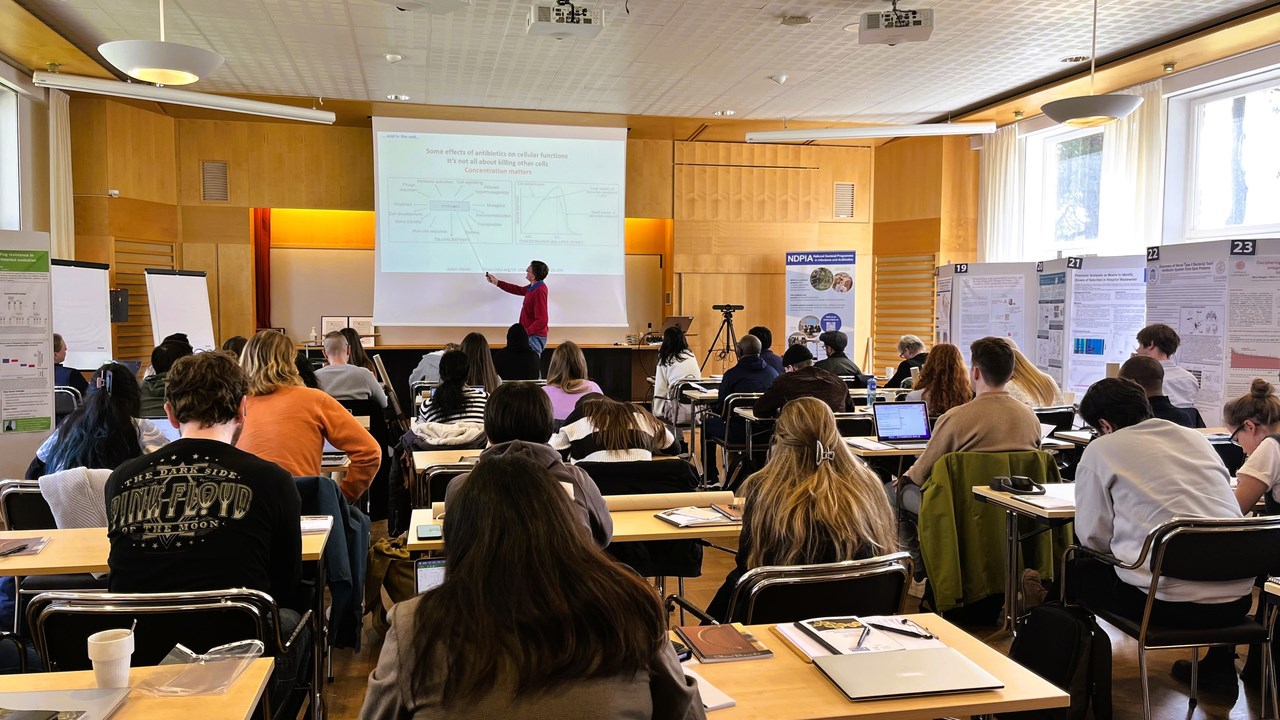
Professor Diarmaid Hughes from Uppsala University gives a lecture on "Resistance from a microbe perspective" during the NDPIA course "Antibiotics and Antibiotic Resistance" - one of the most popular courses held at Stora Brännbo in Sigtuna, 2024.
ImageHanna ErikssonHowever, designing and organizing a course is a team effort and Debra’s helping team is critical for producing a quality course and for finding top international scientists to provide the lectures. National expert researchers on the course topic, who are willing to help, work together with NDPIA to create a course schedule with possible lecturer names.
“We cherry-pick national and international renowned scientists to invite, but as the professors are always super busy, it is important to have a pool of names for each lecture.”
In addition to designed courses, NDPIA subscribes to training courses in graphic design to visualise science and to a suite of 26 on-demand courses with topics from designing an experiment to advancing a career provided by Nature Masterclasses from Springer Nature.
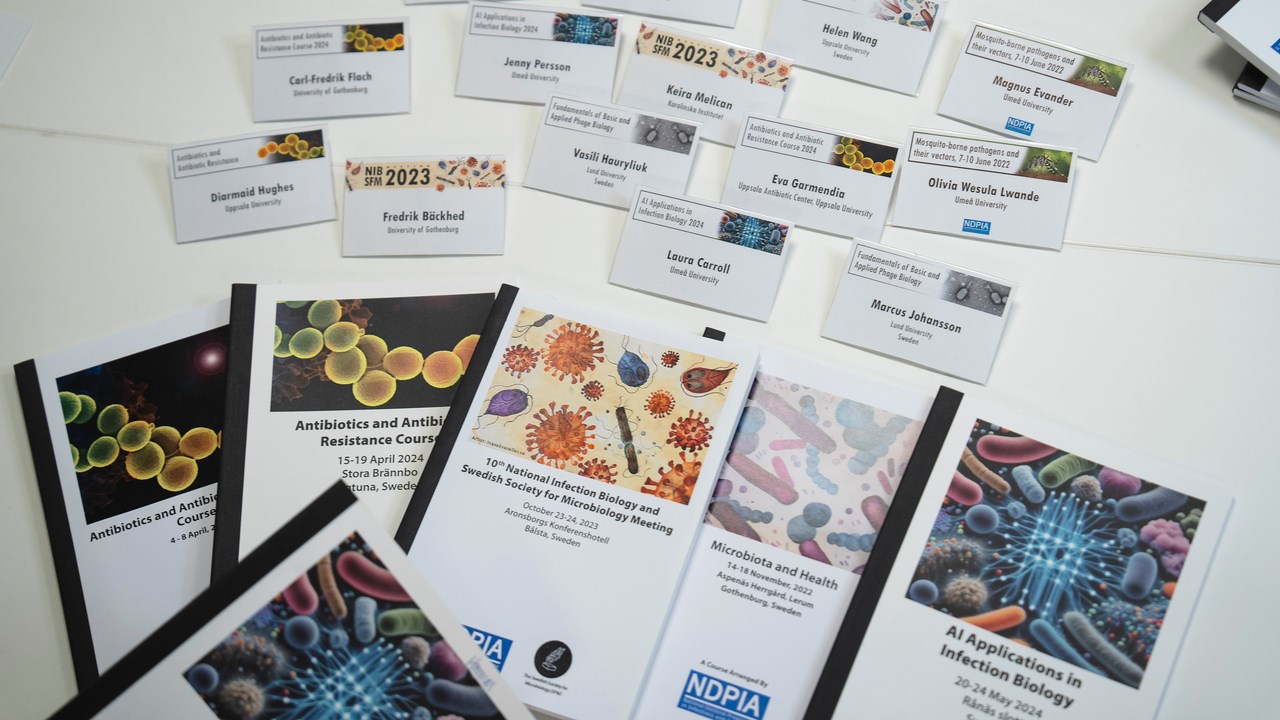
Every course is documented in a booklet.
ImageMattias PetterssonFurthermore, by co-funding of travel and accommodation costs, NDPIA supports short research stays in Sweden or abroad, and participation in the biannual National Infection Biology Meeting. This conference is an important network meeting for all NDPIA members and is organized jointly with the Swedish National Infection Biology network and the Swedish Society for Microbiology.
“I do believe what is most unique with our research school is that the financial support from the Swedish Research Council has been so generous and has allowed us to strengthen the national, and even international, network for Swedish infection biologists to attract young scientists to this field of research.”
At the end of this year, Debra Milton retires and Annasara Lenman, associate professor at the Department of Clinical Microbiology at Umeå University, will become the new director of the research school.
“For sure I will miss my job, but I will also find time for other things! I will take up sewing again, cooking, read books especially on history, and learning Swedish more profoundly. Also, a reunion party with my old school friends last summer made me dream of moving back to the US.”
Right now, Debra Milton’s last task is to write the NDPIA ten-year report. Through the years, as many as 740 PhD students and postdocs have enrolled as members.
“What is interesting, is that most of our members are still doing research, not necessarily as assistant or associate professors but as staff scientists at universities or employed in companies. I hope that NDPIA has played a small role in their continued interest in research.”
Reflecting on the future, Debra Milton thinks that funding will be a challenging issue, and a new funding source is crucial. This past Spring, the Swedish Research Council opened a new call for funding for a research school within infection biology.
“Hopefully, our NDPIA application will be a success and we can continue helping to strengthen the national and international network for infection biology in Sweden.”